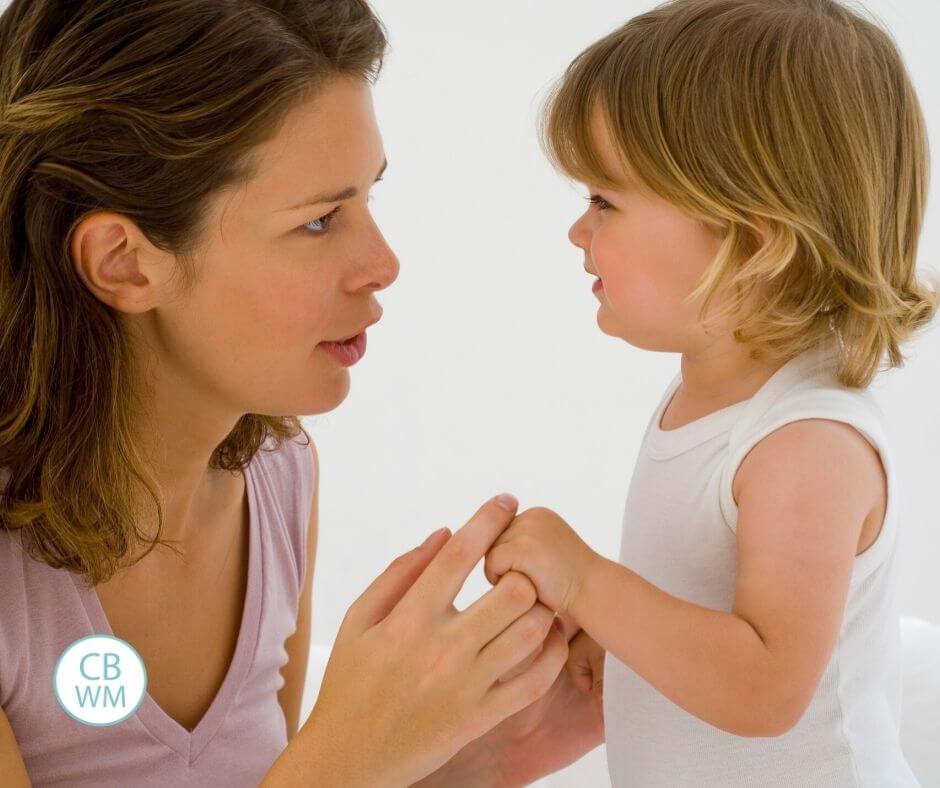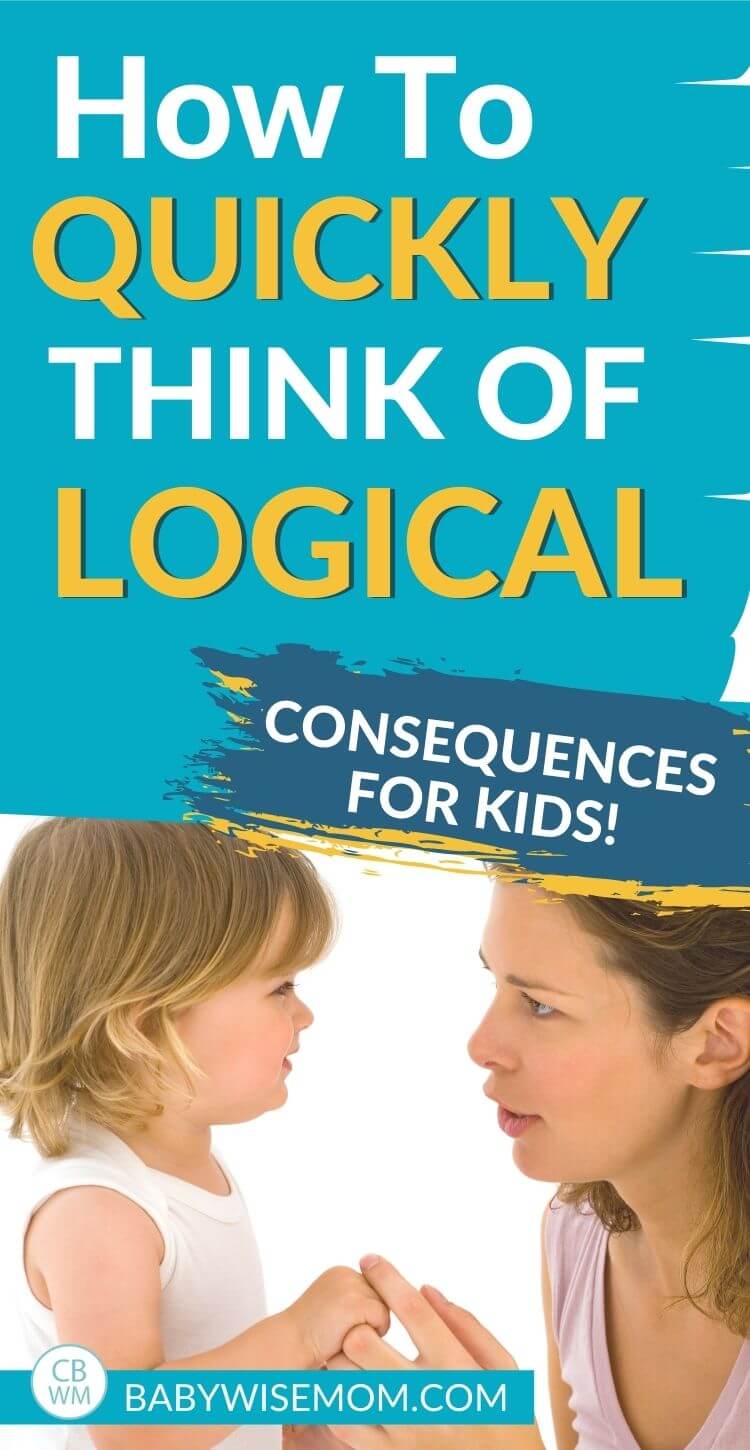Logical consequences are a powerful parenting tool, but it can be hard to think of them in the moment. Use this trick to make it easy.

Logical consequences are my favorite tool to use to help children learn life lessons and follow directions.
I find logical consequences very effective for helping children learn to obey.
Some parents do not have minds that naturally flow into the logical, realm, which is fine. But for those parents, thinking of a logical consequence in a moment can be difficult.
Even for parents who are logical by nature, thinking of a good logical consequence can be tricky at the exact moment.
Post Contents
- How to Decide Logical Consequences: What Was Mis-Used
- Child Responds to Instruction with “No”
- Child Throws Toys
- Child Touches Things She Shouldn’t
- Child Gets Out of Bed When She Shouldn’t
- Child Hits (Playfully or Meanly)
- Child Doesn’t Stay By You In Store
- Child Rips Pages In Books
- Child Refuses To Eat
- Conclusion
- RELATED POSTS
How to Decide Logical Consequences: What Was Mis-Used
On Becoming Preschoolwise has a list of different tools of correction for your little preschooler, including logical consequences.
Ezzo, author of Preparation for Parenting (and co-author of Babywise) has an easy, one-step process to help you think of something:
What is it your child misused?
Once you identify what was misused, you can make the consequence flow from that.
Let’s look at some concerns you readers have had and give a short, simple logical consequence for it.
Child Responds to Instruction with “No”
Many of you have wondered what to do when your child tells you no when given a direction.
What was misused?
In this case, the child mis-used a verbal freedom.
You could remove verbal freedoms for a period of time. You can also remove the freedom to choose. So if you asked your child to come to you, she said no, you go pick her up and bring her to you.
You can also remove something related to the direction you gave.
You told your child to clean up the toys and she said no? She might lose those toys for a certain period of time.
>>>Read: How to Respond When Your Kiddo Tells You “No”
Child Throws Toys
If your child throws a toy, then your child mis-used the toy. I would take the toy away.
The question is then how long do you keep the toy away? That can vary depending on how often this has happened, how old your child is, and the circumstance around the toy-throwing.
>>>Read: Logical Consequences for Throwing Toys
Child Touches Things She Shouldn’t
There will be many times your child will touch something she shouldn’t. The child mis-used her physical freedoms and is ignoring you.
A good logical consequence would say, “That is too bad that you touched the stove after I told you not to! I guess you will have to sit in your high chair since you can’t control yourself.”
>>>Read: Child-Proofing vs. House-Proofing
Child Gets Out of Bed When She Shouldn’t
Almost every child will test this boundary at some point. Do not be surprised or worrried when it happens.
In this situation, the child is mis-using her freedom to choose when to get out of bed.
This is harder than simply taking away that freedom because that doesn’t mean the child won’t stay put.
You might need to remove another freedom associated with the bedroom or add time to how long the child should be in bed. You can also take away a privilege that happens after bed (like TV time).
>>>Read: What To Do When Your Toddler/Child is Getting Out of Bed
Child Hits (Playfully or Meanly)
If your child is being physically aggressive, then your little one is misusing her hands.
If she won’t control her hands, you need to remove her from being able to contact others with her hands.
If you are with friends at the park, you might leave immediately.
If you are at home, you might remove her from other family members. You want to remove the child from her victims. Do not just tell her to stop but leave her to still hit others.
>>>Read: Logical Consequences to Stop Kids Hitting and Biting
Child Doesn’t Stay By You In Store
If your kiddo is not staying by you at the story, then your little one is misusing the freedom to move on her own.
If you have a cart available, I would put her in the cart right away. An obvious potential problem with this is the tantrum that would follow. If that happened, the next step would be to leave the store (NOT to put her on the floor again and allow her to walk).
But this leads to me needing to point out that you don’t want to allow the freedom of walking before the child is old enough to handle it. If you do, you need to be fully prepared to walk out of that store without purchasing anything if needed.
Do not let your child walk by you in the store if she is not consistently listening at home.
>>>Read: How To Respond When Your Child has a Public Tantrum
Child Rips Pages In Books
If your child is ripping pages in books, then he is missing books, so the natural lead would be no books.
I would hate that to be a consequence as a parent, so I would say the child is only able to look at books that have no pages to rip (board books and soft books) unless Mom or Dad is holding the book for her.
Kaitlyn once took a library book to bed and pulled the library stickers off. Her consequence was that she was not allowed to take library books to her room for a significant period of time.
Child Refuses To Eat
In most cases, I wouldn’t actually view this as negative behavior.
I prefer to follow a child’s lead on food and not make things a battle. I have my children try something once, but if they don’t like it, that is fine.
They then need to try it each time we have it. If we have it often, I have them try it every couple of months.
For example, Brayden has never liked corn. He loves most vegetables, so this isn’t a general defiance thing. He just doesn’t like corn. That is totally fine. We all have things we don’t like. We have that frequently, so I have him try it every once in a while.
Every few months, I have him take a bite because our taste buds are always changing and he might decide he likes it someday. But once he says he doesn’t like it, that is all he needs to eat.
Conclusion
I hope that helps get your logical consequence mind flowing. When your child does something wrong, remember the question “what did my child mis-use?” Then go from there.
Logical consequences are extremely effective. I use logical consequences more than any other discipline method by far. Work to get in the mindset.
RELATED POSTS
- Consequences: Natural VS Logical and How to Use Each
- 10 Guidelines for Using Logical Consequences
- Natural Consequences vs. Grace
- How Too Many Freedoms Leads to Disobedience
- All The Help Parents Need for Consequences
This post originally appeared on this blog December 2010

